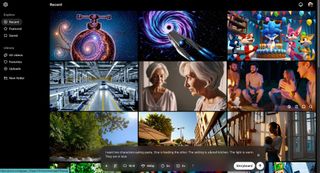Sora AI video generation is here and it’s so good it’s made me want to stump up $200 for OpenAI’s ChatGPT Pro tier
Now it all makes sense

Like most people I was as little confused when OpenAI announced a $200 (£157, AU$313) ChatGPT Pro tier since its previous paid-for subscription was a comparatively small $20 (£16 AU$30) a month for ChatGPT Plus. You can of course, continue to use ChatGPT for free on the free tier.
$200 was a big jump up and at the time of announcement because it offered only modest advantages over ChatGPT Plus. For your $200 you got access to o1 pro mode, which is a version of the latest o1 LLM from OpenAI that uses more compute to think harder and provide better answers. To me, $200 seems like a lot of extra cash for harder thinking.
Sure, if you’re involved in research-level activities, or need what OpenAI describes as the “more reliably accurate and comprehensive responses, especially in areas like data science, programming, and case law analysis”, then maybe you do need it. To me it seems like that's such a small subset of the ChatGPT user base that it felt that ChatGPT Pro was simply being used a price anchor. A price anchor is essentially a marketing device designed to make your other pricing levels look competitive. Compared to a $200 ChatGPT Pro subscription, a $20 ChatGPT Plus subscription suddenly looks like very good value.

However, yesterday OpenAI released Sora (or more specifically Sora Turbo, the latest and fastest version so far), its frankly, amazing AI video generation tool, and it’s changed everything. If you haven’t seen Sora before then just look at the videos it's capable of producing, like this foam seahorse:
To use Sora you simply type in what you'd like to see, and it generates the video for you. Sora is only available on a paid ChatGPT subscription and it works on a credit system. On a ChatGPT Plus subscription you get up to 50 priority videos a month. That's 1,000 credits. Your videos are limited to 720p resolution and five seconds in duration. While that’s enough for you to explore video creation it’s nowhere near enough for you to make anything serious.
But once you change to a ChatGPT Pro subscription you get up to 500 priority videos a month (that’s 10,000 credits) with the ability to create unlimited ‘relaxed videos’ at up to 1080p resolution, 20 seconds in duration and with five concurrent generations. You can also download videos without a watermark.
That means that after you use up all your priority generation videos in a given month you can still generate unlimited videos, but you move into ‘relaxed mode’ where you will have to wait longer for video generation.
This is where a ChatGPT Pro subscription suddenly makes sense. Without it you simply can’t use your Sora-created video professionally. Equally, you could argue the fact that ChatGPT Plus users, who are after all paying for the service, don’t get to remove the watermark from their videos, and are limited to 720p and five-second clips, is a bit unfair.
So, while a $200 ChatGPT Pro started off looking like really bad value, the release of Sora has revealed exactly why you'd want to pay that much a month for a subscription. You can call it unfair if you like, but at least it makes sense now.
More excitingly, we're not done yet. OpenAI has another nine days of releases left in its 12 Days of OpenAI event, so it's quite possible that even more value will be added to a ChatGPT Pro subscription before it's over. We'll have to wait and see what happens.
You might also like...
Get daily insight, inspiration and deals in your inbox
Sign up for breaking news, reviews, opinion, top tech deals, and more.

Graham is the Senior Editor for AI at TechRadar. With over 25 years of experience in both online and print journalism, Graham has worked for various market-leading tech brands including Computeractive, PC Pro, iMore, MacFormat, Mac|Life, Maximum PC, and more. He specializes in reporting on everything to do with AI and has appeared on BBC TV shows like BBC One Breakfast and on Radio 4 commenting on the latest trends in tech. Graham has an honors degree in Computer Science and spends his spare time podcasting and blogging.
Most Popular


